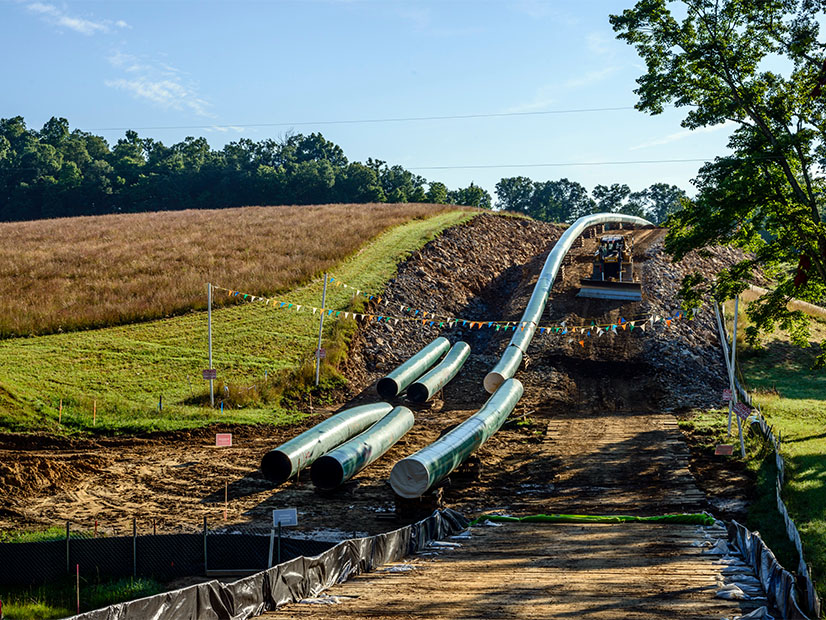The Mountain Valley Pipeline’s Southgate extension asked FERC for a three-year extension to build the project after Congress passed a law pushing through the mainline of the project, which ran into protests in comments filed Monday.
The Southgate extension would run 75 miles from the end of the MVP Mainline in southern Virginia to central North Carolina, bringing natural gas from the Marcellus and Utica shale to Dominion Energy subsidiary’s Public Service North Carolina Energy’s distribution system. Equitrans Midstream Corporation owns 47% of the project, NextEra Energy 32.16% and AltaGas 10%.
Both pipelines were initially supposed to be done by now, but the Mainline has been tied up in litigation and that contributed to delays of the Southgate extension, which needs Mainline to be built so it can actually ship natural gas.
“The circumstances have changed,” the pipeline told FERC on June 15. “President Biden signed legislation that will expedite the completion of the Mainline System, which the United States Congress found and declared to be in the national interest.”
That filing came into FERC a few weeks before the pipeline’s opponents got the Fourth Circuit Court of Appeals to issue a stay on construction of the project as the court considers challenges to that legislation. The pipeline has asked Supreme Court Chief Justice John Roberts to overturn that stay, asking for a ruling by July 26.
The projects continued legal woes came up repeatedly in comments on Southgate’s extension request, with North Carolina Gov. Roy Cooper (D) telling FERC that the argument that more time is warranted because Mainline will be completed quickly is “clearly erroneous.” North Carolina has a law requiring a 70% cut in carbon emissions from the power sector by 2030 and carbon neutrality by 2050.
“Proponents of MVP Southgate have argued that the pipeline is needed for new electricity generation units,” Cooper said. “However, due to the requirements of Session Law 2021-165, any newly constructed natural gas fueled electricity generation units will be forced to retire before the end of their useful lives, leading to sunk costs that will be charged to North Carolina’s ratepayers.”
Cooper also argued that the pipeline is not needed for heating after the federal Inflation Reduction Act gave incentives for customers to move away from natural gas.
A group of several dozen legislators from North Carolina also urged FERC to reject the application, saying that the pipeline is not needed.
“There is no need for the gas MVPS is proposing to transport,” the legislators said. “Years’ worth of evidence points to how the developers overstated the demand for gas, and upgrades to existing infrastructure show increased available capacity substantiates the lack of market need for the MVP.”
Dominion Energy’s PSNC asked FERC to grant the extension, saying that it has added 100,000 customers in the past decade without any new supply. It signed a contract with MVP Southgate for a 20-year term of 300,000 dekatherms per day and a related 250,000 dekatherms per day from the Mainline Project.
“The project will provide geographic diversity of supply through access to Marcellus and Utica shale gas and will alleviate price swings that PSNC has experienced in the past,” the utility said. “MVP Southgate will improve reliability and add resiliency to the interstate pipeline services that PSNC receives and enable PSNC to gain optionality in selecting best-cost supply sources,”
Duke Energy urged FERC to grant the extension request, given that the litigation around the MVP project has been outside of its backers’ control and the commission issued similar extensions for the Mainline Project. Duke said the pipeline would help it secure fuel for natural gas power plants.
“The companies have experienced significant growth in natural gas demand for power generation and expect that trend to continue as the company retires its coal units,” Duke said. “Today, the Carolinas and the companies face a potential fuel security challenge that will be difficult to improve without completion of Southgate, which would allow increased physical gas deliverability into the Carolinas.”
New natural gas will help balance new renewables and is the least cost replacement for aging coal fired power plants, but they will require more pipeline infrastructure because the main pipeline serving Duke’s territory, Transcontinental Pipeline, is fully subscribed and constrained during periods of high use, especially during the winter.
“Increased pipe infrastructure allowing Appalachian Gas to flow into the Carolinas can play a key role in enabling the companies’ generation transition while supporting the communities and businesses that rely upon us for their energy needs today and in the future,” Duke said.
The Natural Resources Defense Council noted that the federal debt deal might have eased the federal permitting process for MVP, but it failed to reckon with market conditions that have changed since the pipeline was first proposed.
“Given national, state and regional commitments to move away from natural gas as an energy source in the coming years, combined with continued uncertainty around the fate of the Mainline system, the commission must reject Mountain Valley’s plea and deny the extension request,” NRDC said. “Denying this extension provides the commission with a logical imperative opportunity to demonstrate its commitment to a sensible energy future by refusing to saddle the public with another stranded asset inconsistent with statewide, regional, and federal energy needs, and ultimately the public interest.”
The firm effectively has stopped trying to get permits for the Southgate project, waiting for the litigation around Mainline to play out. It has failed to resubmit for a water permit in North Carolina, an air permit in Virginia, and it has halted all eminent domain proceedings.
“Mountain Valley has sat on its hands during the certificate period–abandoning efforts to secure crucial permits for the project, time and time again,” NRDC said. “These pending litigation- and permitting-related delays are entirely within Mountain Valley’s control.”
FERC requires that developers continue to work on their projects when it grants extensions, but in this case that has amounted to focusing on the Mainline Project, NRDC said.




